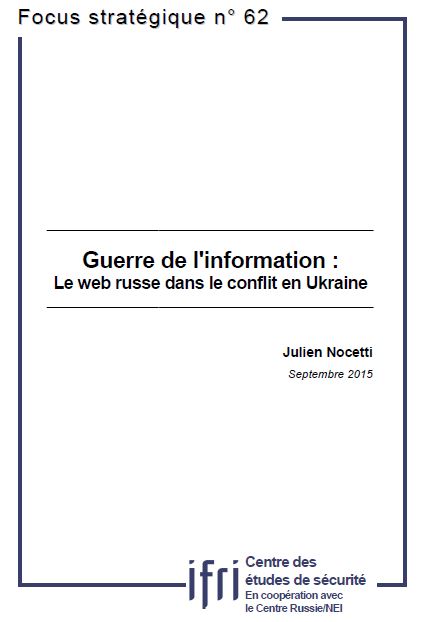Guerre de l'information : le web russe dans le conflit en Ukraine

Since the beginning of the crisis in Ukraine, Russia has been waging an information war.
Russian information warfare reflects its perception of its relationship towards the West as being that of a state of permanent conflict which needs the use of alternative tools to weaken both the enemy’s will and the capabilities. Up to this day, Russian information warfare has followed two main lines of actions: tightening the control over the Russian internet, in order to prevent any scenario of popular uprising coupled with an activist use of the web; and undermining the objectivity of Western and Ukrainian media coverage of the crisis. Despite some successes at the beginning of the conflict, Russian heavy-handed propaganda techniques did not allow the Kremlin to influence the international media as much as the alleged ambitions and the current means could lead to expect. They are, on the contrary, harming Russia's image both in its Near Abroad and in the West.
This content is available in French: Guerre de l'information : le web russe dans le conflit en Ukraine
Related centers and programs
Discover our other research centers and programsFind out more
Discover all our analysesBundeswehr: From Zeitenwende (historic turning point) to Epochenbruch (epochal shift)
The Zeitenwende (historic turning point) announced by Olaf Scholz on February 27, 2022, is shifting into high gear. Financially supported by the March 2025 reform of Germany’s “debt break” and backed by a broad political and societal consensus to strengthen and modernize the Bundeswehr, Germany's military capabilities are set to rapidly increase over the coming years. Expected to assume a central role in the defense of the European continent in the context of changing transatlantic relations, Berlin’s military-political position on the continent is being radically transformed.
Main Battle Tank: Obsolescence or Renaissance?
Since February 2022, Russian and Ukrainian forces combined have lost more than 5,000 battle tanks, a much higher volume than all the European armor combined. Spearhead of the Soviet doctrine from which the two belligerents came, tanks were deployed in large numbers from the first day and proved to be a prime target for UAVs that became more numerous and efficient over the months. The large number of UAV strike videos against tanks has also led a certain number of observers to conclude, once again, that armor is obsolete on a modern battlefield. This approach must, however, be nuanced by a deeper study of the losses and their origin, UAVs rarely being the sole origin of the loss itself, often caused by a combination of factors such as mines, artillery or other anti-tank weapons.
Mapping the MilTech War: Eight Lessons from Ukraine’s Battlefield
This report maps out the evolution of key technologies that have emerged or developed in the last 4 years of the war in Ukraine. Its goal is to derive the lessons the North Atlantic Treaty Organization (NATO) could learn to strengthen its defensive capabilities and prepare for modern war, which is large-scale and conventional in nature.
"Iron Swords" A Military Analysis of Israel's War in Gaza
On October 7, 2023, Hamas' attack, dubbed “Al-Aqsa Flood,” caused a major shock and led Israel to launch the longest war in its history. Operation “Iron Swords” was notable for its unprecedented intensity, both in terms of the massive ground forces deployed and the firepower used.













